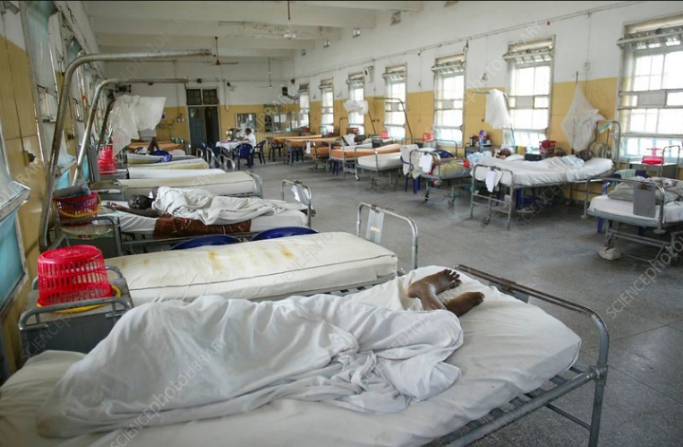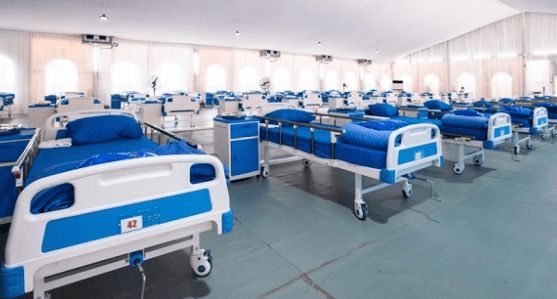A stark warning reverberated through the corridors of legislative power as the House of Representatives Committee on Health laid bare a pressing issue—Nigeria’s diminishing health workforce.
This revelation comes as a clarion call to address the critical state of the country’s healthcare system. At the epicenter of this concern is the prestigious Lagos University Teaching Hospital (LUTH), Nigeria’s flagship health training institution. The committee highlighted the exodus of doctors and nurses from LUTH to various international destinations, sounding an alarm over the consequences this has wrought on the nation’s healthcare infrastructure.
The ramifications of this healthcare brain drain are becoming increasingly evident, with the closure of five wards at LUTH, amounting to a staggering 150 beds lost. This not only poses a direct threat to the health services provided by the institution but also underscores the broader challenges facing the nation’s ability to retain skilled medical professionals.
As Nigeria grapples with the global movement of its healthcare workforce, urgent interventions are imperative to mitigate the adverse effects on patient care and medical education. The House of Representatives Committee’s revelation serves as a poignant reminder that addressing the root causes of this health manpower decline is not just a matter of policy but a crucial imperative for the well-being of the nation.
Legislative Efforts to Address Escalating Medical Tourism Trends in Nigeria
In a crucial response to the alarming surge in medical tourism among Nigerians, commonly referred to as the ‘japa syndrome,’ Dr. Amos Magaji, the chairman of the legislative committee, has voiced profound concern. Recognizing the detrimental impact of health workers’ migration on the nation’s healthcare system, Dr. Magaji underscored the imperative for a holistic solution. His comprehensive approach entails legislative strategies aimed at stemming the brain drain phenomenon.
Central to these efforts is a commitment to bolstering the healthcare infrastructure, ensuring it reaches state-of-the-art standards. Simultaneously, the focus is on enhancing the allure and rewards within the healthcare sector, regardless of specialization, to dissuade professionals from seeking opportunities abroad.
The legislative initiatives put forth by Dr. Magaji emphasize a proactive stance toward curbing medical tourism by addressing its root causes. The proposed measures not only target the exodus of skilled health professionals but also aim to create an environment where the local healthcare system becomes a preferred choice.

This multifaceted approach aligns with the committee’s vision to fortify Nigeria’s healthcare sector, making it robust, attractive, and capable of meeting the diverse needs of its citizens. As the nation grapples with the challenges posed by the ‘japa syndrome,’ these legislative endeavors signal a concerted effort to safeguard and elevate the quality of healthcare within Nigeria’s borders.
LUTH’s Critical Wards Grapple with ‘Japa’ Syndrome, Forcing Closure
In a recent scrutiny of Lagos University Teaching Hospital (LUTH), Dr. Magaji, leading a conscientious oversight committee, spotlighted the immediate adversities confronting the medical facility. A dire consequence of the ‘japa’ syndrome—a colloquial term encapsulating the emigration of skilled healthcare professionals—has resulted in the deactivation of five vital wards and 150 essential beds due to an acute shortage of doctors and nurses.
Dr. Magaji, echoing the concerns of the committee, not only voiced the urgency of addressing this healthcare crisis but also unveiled a collaborative commitment with both the Federal Government and LUTH. The committee’s unified pledge aims to redress the national embarrassment triggered by the rampant brain drain, assuring Nigerians that comprehensive short-term and long-term strategies are in the pipeline to uproot the ‘japa’ syndrome and fortify the nation’s healthcare infrastructure.
As Dr. Magaji navigates the intricacies of this multifaceted challenge, his assurance resonates with a promise to implement strategic measures. The pledge encompasses not only immediate interventions to reinstate critical medical services but also a foresighted approach to mitigate the systemic factors fueling the ‘japa’ phenomenon. This proactive stance underscores a commitment to reversing the trend at its roots, ensuring a sustainable healthcare environment for both current and future generations.
Committee’s Holistic Approach From Universities Enrollment To Residency Programs
In a groundbreaking initiative, the committee, under the astute leadership of Chairman Dr. Magaji, has unveiled a meticulously crafted strategy to combat the pervasive issue of brain drain within the healthcare sector. Understanding the intricacies of the problem, the committee has chosen a holistic approach that spans from the initial phase of university enrollment to the crucial stage of residency programs. Dr. Magaji emphasized the need to address challenges faced by health workers at every level, with a particular focus on house officers and those undergoing residency training.
This comprehensive strategy reflects a nuanced understanding of the complexities inherent in retaining skilled healthcare professionals. Dr. Magaji’s commitment to a gradual, systematic resolution underscores the committee’s recognition that the healthcare crisis cannot be remedied through quick fixes. By acknowledging the long-term nature of the issue, the committee positions itself as a driving force for sustainable change in the sector. This approach not only demonstrates a forward-thinking mindset but also aligns with the committee’s dedication to implementing reforms that will yield lasting positive impacts on the healthcare workforce and, consequently, the overall health system.
International Acclaim and LUTH’s Plea for Local Support
Professor Adeyemo highlighted the global acknowledgment of LUTH’s Cancer Centre, with citizens from Europe, Africa, and America seeking treatment. He called on Nigerians to patronize the facility, emphasizing the importance of local support. The Chief Medical Director expressed gratitude for the support received from the federal government and the House of Representatives, emphasizing the collaborative effort required to overcome the challenges posed by the brain drain in the healthcare sector.

In a remarkable turn of events, Professor Adeyemo, at the helm of Lagos University Teaching Hospital’s (LUTH) Cancer Centre, underscored the institution’s burgeoning international acclaim. Patients from Europe, Africa, and America are now turning to LUTH for cutting-edge cancer treatment, signaling a paradigm shift in the medical landscape. This global recognition not only speaks volumes about the center’s advanced medical expertise but also positions it as a key player on the international healthcare map.
Local Appeal: A Call for Unified Support to Sustain Progress
In a compelling plea for solidarity, Professor Adeyemo, amidst the international acclaim garnered by LUTH, fervently implores his fellow Nigerians to prioritize the Cancer Centre for their healthcare needs. His impassioned appeal extends beyond a mere endorsement, delving into the intricate web of interdependence between the center and the local community. Accentuating the pivotal role of indigenous backing, Adeyemo not only acknowledges the support received from the federal government and the House of Representatives but also underscores the pressing need for a collaborative approach to confront the escalating challenges fueled by the departure of healthcare professionals from the nation.
The Chief Medical Director’s call for unity resonates as a strategic imperative in the face of a burgeoning brain drain crisis. The plea extends beyond the immediate concerns, articulating a broader vision for a healthcare system marked by resilience. With an acute awareness of the precariousness induced by the exodus of medical expertise, Adeyemo envisions a collective effort as the cornerstone to fortify the healthcare infrastructure against such adversities, ensuring the continued delivery of world-class medical services within the local sphere. This impassioned call not only serves as a rallying cry for immediate action but also articulates a visionary roadmap for a sustainable, high-quality healthcare system that transcends the challenges posed by global dynamics.
Table of Contents
Discover more from OGM News NG
Subscribe to get the latest posts sent to your email.















Good job on this article! I really like how you presented your facts and how you made it interesting and easy to understand. Thank you.
I like this blog so much, saved to my bookmarks .